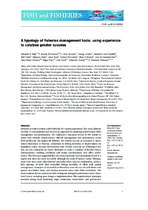A typology of fisheries management tools: using experience to catalyse greater success
Date
2016Author
Selig, Elizabeth R
Kleisner, Kristen M
Ahoobim, Oren
Arocha, Freddy
Cruz-Trinidad, Annabelle
Fujita, Rod
Hara, Mafaniso
Katz, Laure
McConney, Patrick
Ratner, Blake D
Saavedra-Dıaz, Lina M
Schwarz, Anna-Maree
Thiao, Djiga
Torell, Elin
Villasante, Sebastian
Troëng, Sebastian
Metadata
Show full item recordAbstract
Fisheries provide nutrition and livelihoods for coastal populations, but many fisheries are fully or over-exploited and we lack an approach for analysing which factors affect management tool performance. We conducted a literature review of 390 studies to assess how fisheries characteristics affected management tool performance across both small-scale and large-scale fisheries. We defined success as increased or maintained abundance or biomass, reductions in fishing mortality or improvements in population status. Because the literature only covered a narrow set of biological factors, we also conducted an expert elicitation to create a typology of broader fishery characteristics, enabling conditions and design considerations that affect performance. The literature suggested that the most commonly used management tool in a region was often the most successful, although the scale of success varied. Management tools were more often deemed successful when used in combination, particularly pairings of tools that controlled fishing mortality or effort with spatial management. Examples of successful combinations were the use of catch limits with quotas and limited entry, and marine protected areas with effort restrictions. The most common factors associated with inadequate biological performance were ‘structural’ issues, including poor design or implementation. The expert-derived typologies revealed strong local leadership, high community involvement and governance capacity as common factors of success across management tool categories (i.e. input, output and technical measures), but the degree of importance varied. Our results are designed to inform selection of appropriate management tools based on empirical data and experience to increase the likelihood of successful fisheries management.

